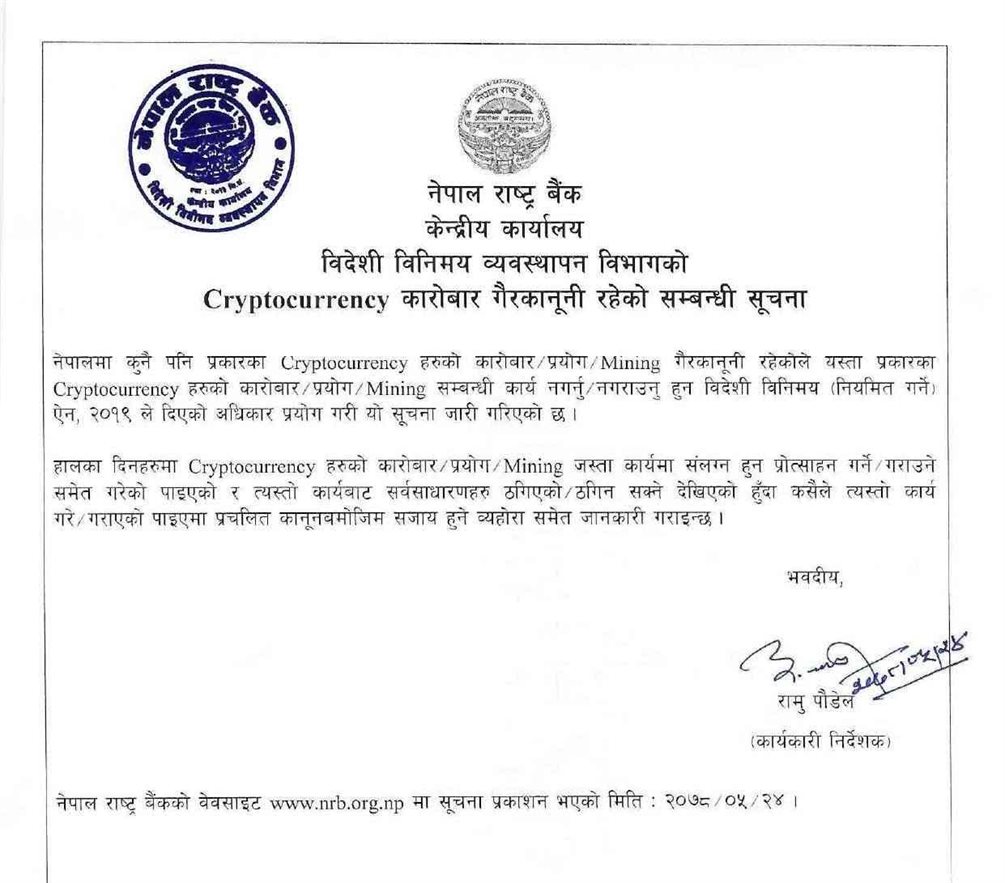How to Keep Your Crypto Wallet Safe? Cryptocurrency is illegal in Nepal
14th September 2021, Kathmandu
Are you trying to keep your Crypto wallet safe? Also, do you know Cryptocurrency is illegal in Nepal? Let’s find out the detail in this article below.
Cryptocurrency is binary data designed to work as a medium of exchange. Wherein individual coin ownership records are stored in a ledger existing in a form of a computerized database using cryptography. Cryptography helps to secure transaction records and also to create additional coins, as well as verify the transfer of coin ownership.
However, some crypto schemes use validators to maintain the cryptocurrency. For the proof, owners put up their tokens as collateral. Which in return, they receive authority over the token in proportion to the amount they stake. Usually, these token stakes get additional ownership in the token over time through network fees, newly minted tokens, and other reward mechanisms.
Unfortunately, regardless of all these safety measures, Cryptocurrency account hacking is on the rise. Virtual currencies often become a target for hackers that want to take advantage of these assets.
However, tracking the work of hackers is often challenging, because their footprints can be eliminated digitally. When a crypto wallet is hacked, investors do not have any resources legally since the virtual coins are still unregulated by a government entity.
Here are some steps to prevent your Crypto wallet from hacking.
Approach to secure your digital wallet
1. Two strong passwords
Always remember not to reuse passwords across your accounts. Especially in Cryptocurrency accounts, as it is the prime target for hackers. Cryptocurrency is an innovative technology that is evolving rapidly. The easiest way to secure your crypto wallet is with tried-and-true security tactics.
2. Always work with reputed Cryptocurrency wallets, exchanges, brokerages, and apps
Firstly, you should do careful research on each platform’s security features to know how their data will be protected. Entities should incorporate best security practices like requiring multifactor authentication, SSL, or TLS encryption.
As well as using air-gapped devices that are kept offline when storing cryptocurrency.
3. Keep yourself safe from mobile fishing
Most people use mobile apps to manage crypto wallets. However, these commodities soar in price, malicious hackers are motivated to target investors with mobile phishing campaigns to seat your credentials. These attacks can come from anywhere on mobile devices like texts, social media, third-party messaging apps, or email.
Moreover, there are malicious mobile apps that have the hidden ability to log your keystroke or watch the activities on your screen.
4. Always keep track of how your crypto wallet transaction is used
Don’t forget to apply the core principles of “Cyber Resilience” to your wallet. A Crypto wallet is a piece of data and code that holds a good amount of value for you and others. But be aware of how your transaction is used. Be sure that systems and networks are not compromised if you are using them for transactions and have physical protection in place.
5. Never share your secret key
Your secret key is used to validate that the person sending or receiving the digital coins is the owner of the wallet. You should never share this secret or private key. However, the safest way to keep those safe is by using cold storage. It means printing out your key and removing all the digital traces.
Also, the semi-fail safe method of recovering your private key is to use a seed. It’s a series of randomly generated words that a user can leverage.
Cryptocurrency is Illegal in Nepal
However digital currency is increasing in popularity across the world. In Nepal, Cryptocurrencies are considered illegal forms of financial tender. Cryptocurrency is the new decentralized form of currency that took the world by storm.
But, according to the Act of Nepal Rastra Bank and Foreign Exchange Regulation Act 2019. Cryptocurrency is declared as an illegal form of financial tender. Also, Central Investigation Bureau even arrested two individuals for running Bitcoin mining in 2019.
Nepal still lacks advanced technology to monitor cryptocurrency. Therefore, most of the transactions of cryptocurrencies are not possible to regulate in Nepal.
Hence, cryptocurrency legislation is not even considered in Nepal.








